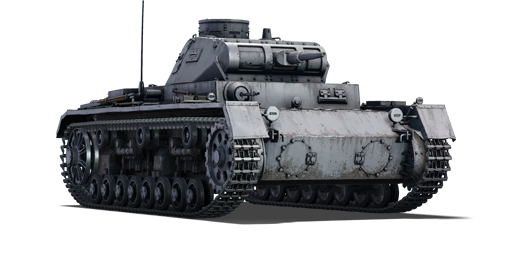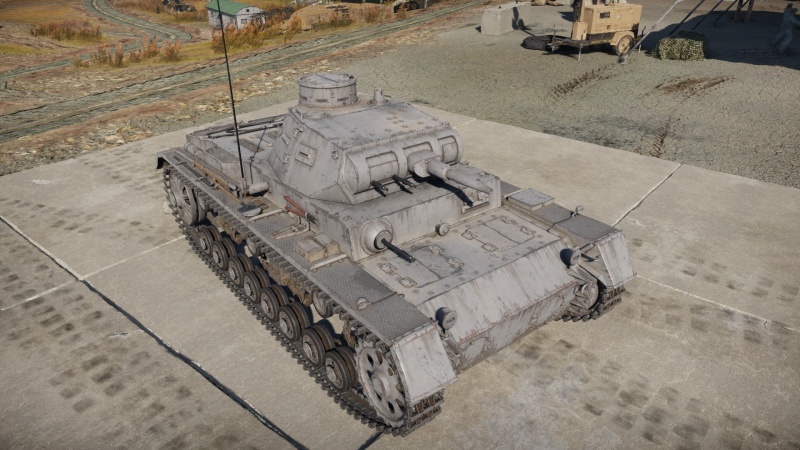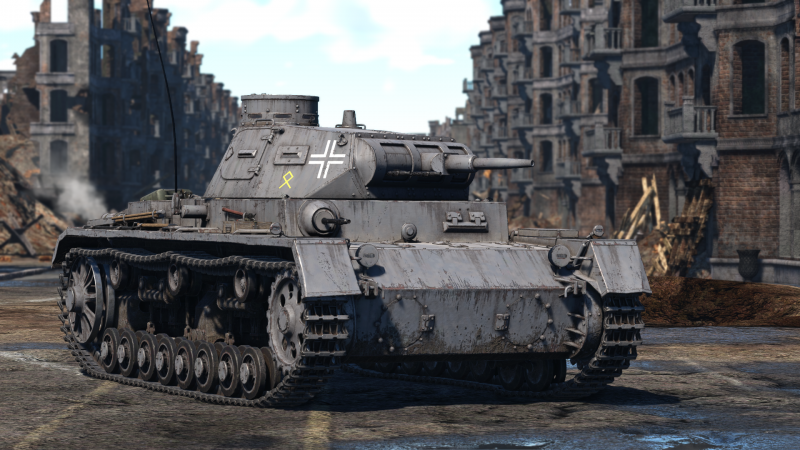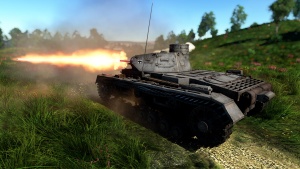Difference between revisions of "Pz.III B"
Colok76286 (talk | contribs) (Undo revision 162575 by U133025971 (talk)) |
(→Pros and cons: note about reverse speed was reverted in the battle usage section, so I noted it here) (Tag: Visual edit) |
||
| (14 intermediate revisions by 5 users not shown) | |||
| Line 11: | Line 11: | ||
== Description == | == Description == | ||
<!-- ''In the description, the first part should be about the history of the creation and combat usage of the vehicle, as well as its key features. In the second part, tell the reader about the ground vehicle in the game. Insert a screenshot of the vehicle, so that if the novice player does not remember the vehicle by name, he will immediately understand what kind of vehicle the article is talking about.'' --> | <!-- ''In the description, the first part should be about the history of the creation and combat usage of the vehicle, as well as its key features. In the second part, tell the reader about the ground vehicle in the game. Insert a screenshot of the vehicle, so that if the novice player does not remember the vehicle by name, he will immediately understand what kind of vehicle the article is talking about.'' --> | ||
| − | The ''' | + | The '''Panzerkampfwagen III Ausführung B (Panzer III B)''' ([[Abbreviations#.28DE.29_Sd.Kfz._Index|Sd.Kfz. Index:]] '''Sd.Kfz. 141''') is the second variant of the [[Pz.III (Family)|Panzerkampfwagen III medium tank family]]. The Panzer III A variant's arrival into service provided the Germans with a foundation for the construction of an excellent medium tank. While the Germans were largely pleased with the overall concept and design, there was still plenty of space for enhancements and changes. The most serious flaw with the Panzer III A version was its unstable suspension. As a result, the Germans introduced a new variant, the Panzer III B, with the intention of improving the vehicle's suspension and other minor components. The commander's cupola was additionally enhanced by the addition of a new two-part hatch opening. The 37 mm Kampfwagenkanone (KwK) 36 L/46.5 tank gun with 121 rounds of ammo was the main armament of the Panzer III B variant. The secondary armament consisted of three 7.92 mm MG 34 light machine guns, two of which were mounted coaxially with the main gun and one in the hull. Despite being produced in small numbers, the Panzer III B variant saw service during the beginning of World War II. The Germans had no choice but to utilise the Panzer III B during the invasion of Poland in 1939 due to a lack of more advanced tanks. |
| + | |||
| + | Introduced in [[Update 1.59 "Flaming Arrows"]], the Panzer III B is a basic medium tank that will eventually evolve into more advanced Panzer III variants later in World War II. It is significantly weaker than many other tanks of its rank, being armed with a 37 mm KwK36 L/46.5 tank gun. The tank is made of light armour plates and will struggle to protect the tank crew even from close-range heavy machine guns fire. As a result, this tank is practically weak to almost all vehicles in its rank from any angle. Nonetheless, it is a fairly ordinary medium tank with very few advantages and should be used with caution in battle. | ||
== General info == | == General info == | ||
| Line 89: | Line 91: | ||
==== [[Ammo racks]] ==== | ==== [[Ammo racks]] ==== | ||
[[File:Ammoracks_{{PAGENAME}}.png|right|thumb|x250px|[[Ammo racks]] of the {{PAGENAME}}]] | [[File:Ammoracks_{{PAGENAME}}.png|right|thumb|x250px|[[Ammo racks]] of the {{PAGENAME}}]] | ||
| − | <!-- '''Last updated:''' --> | + | <!-- '''Last updated: 2.35.0.20''' --> |
{| class="wikitable" style="text-align:center" | {| class="wikitable" style="text-align:center" | ||
|- | |- | ||
| Line 102: | Line 104: | ||
! Visual<br>discrepancy | ! Visual<br>discrepancy | ||
|- | |- | ||
| − | | '''121''' || | + | | '''121''' || 116 ''(+5)'' || 98 ''(+23)'' || 78 ''(+43)'' || 60 ''(+61)'' || 40 ''(+81)'' || 20 ''(+101)'' || ''0 (+121)'' || No |
|- | |- | ||
|} | |} | ||
'''Note''': | '''Note''': | ||
| − | * Racks disappear after | + | * Racks only disappear after all shells in the rack have been fired. |
| + | * Turret empty: 116 ''(+5)'' shells. | ||
=== Machine guns === | === Machine guns === | ||
| Line 132: | Line 135: | ||
<!-- ''Describe the tactics of playing in the vehicle, the features of using vehicles in the team and advice on tactics. Refrain from creating a "guide" - do not impose a single point of view but instead give the reader food for thought. Describe the most dangerous enemies and give recommendations on fighting them. If necessary, note the specifics of the game in different modes (AB, RB, SB).'' --> | <!-- ''Describe the tactics of playing in the vehicle, the features of using vehicles in the team and advice on tactics. Refrain from creating a "guide" - do not impose a single point of view but instead give the reader food for thought. Describe the most dangerous enemies and give recommendations on fighting them. If necessary, note the specifics of the game in different modes (AB, RB, SB).'' --> | ||
[[File:Pz.III B 1.jpg|thumb|300px]] | [[File:Pz.III B 1.jpg|thumb|300px]] | ||
| − | Overall, the Pz.III B doesn't have many reliable advantages, | + | Overall, the Pz.III B doesn't have many reliable advantages, especially over the E variant. Both the armour and firepower leave a lot to be desired, although its mobility is somewhat functional. However, it just doesn't have any decent aggressive aspects to it that good mobility benefits, meaning that although it is the Pz.III B's most functioning asset, it's still not reliable to play aggressively on the move. The Pz.III B isn't equipped with a short stabiliser, meaning that the gun will be very unstable when coming to a stop, whereas the majority of allied vehicles do have this feature. So if you were to run into one of these vehicles on the move, your enemy will likely get the first shot off, and as your armour protection is so poor they will likely deal critical damage. |
| − | A somewhat reliable way to stay alive in this tank is to play hull-down, a lot of the rounds you'll be taking will be small calibre AP shots. If only your turret is exposed, these rounds will only usually take out 2 crew members at most, allowing for you to back off, repair and re-engage. | + | A somewhat reliable way to stay alive in this tank is to play hull-down, a lot of the rounds you'll be taking will be small calibre AP shots. If only your turret is exposed, these rounds will only usually take out 2 crew members at most, allowing for you to back off, repair and re-engage. Find a spot, take a few shots, and reposition before being spotted, as escaping a bad position is nearly impossible once compromised. The performance of the gun is overall very poor at distances, so even though survivability will be increased by playing at range, firepower will be very inconsistent, so try to find a spot that isn't too far away from combat. |
The turret traverse of the Pz.III B is also very poor, at 4.2 degrees a second in RB mode, because of this it's a good idea to use the hull traverse to swing the turret around faster. The hull traverse itself is fairly fast, so utilising this is a decent habit to get in to. The situation you most want to avoid is losing your driver or engine, as your mobility is the only thing that will keep you in the fight, and the way to ensure this primarily is to stay in cover and not advance too far into the map. If an enemy gets on your side or rear, there's nothing you can really do as your turret traverse is disappointingly poor, so watch your flanks and try to minimise the possibility of an enemy getting behind you. | The turret traverse of the Pz.III B is also very poor, at 4.2 degrees a second in RB mode, because of this it's a good idea to use the hull traverse to swing the turret around faster. The hull traverse itself is fairly fast, so utilising this is a decent habit to get in to. The situation you most want to avoid is losing your driver or engine, as your mobility is the only thing that will keep you in the fight, and the way to ensure this primarily is to stay in cover and not advance too far into the map. If an enemy gets on your side or rear, there's nothing you can really do as your turret traverse is disappointingly poor, so watch your flanks and try to minimise the possibility of an enemy getting behind you. | ||
| Line 155: | Line 158: | ||
* Very slow turret traverse, may not be able the gun on fast targets | * Very slow turret traverse, may not be able the gun on fast targets | ||
* Profile is quite large and tall, making it easier to be seen and shot at, and harder to conceal behind bushes or cover | * Profile is quite large and tall, making it easier to be seen and shot at, and harder to conceal behind bushes or cover | ||
| + | * Poor reverse speed | ||
== History == | == History == | ||
| Line 163: | Line 167: | ||
The suspension of the Pz.III A turned out to be too weak. The same year, a series of fifteen Ausführung B vehicles were built. The five running wheels were replaced by eight wheels with leaf springs. This increased the speed to 35 km/h. With Three instead of two wheels supporting the upper of the track. These vehicles were only intended for training, but eventually had to be assigned to the combat troops. The first models (A to E) were equipped with the short 37 mm KwK / 36 L46.5 gun, which performed sufficiently during the actions in 1939 and 1940. | The suspension of the Pz.III A turned out to be too weak. The same year, a series of fifteen Ausführung B vehicles were built. The five running wheels were replaced by eight wheels with leaf springs. This increased the speed to 35 km/h. With Three instead of two wheels supporting the upper of the track. These vehicles were only intended for training, but eventually had to be assigned to the combat troops. The first models (A to E) were equipped with the short 37 mm KwK / 36 L46.5 gun, which performed sufficiently during the actions in 1939 and 1940. | ||
| − | == | + | == Media == |
| + | <!-- ''Excellent additions to the article would be video guides, screenshots from the game, and photos.'' --> | ||
| + | |||
| + | ;Skins | ||
* [https://live.warthunder.com/feed/camouflages/?vehicle=germ_pzkpfw_III_ausf_B Skins and camouflages for the {{PAGENAME}} from live.warthunder.com.] | * [https://live.warthunder.com/feed/camouflages/?vehicle=germ_pzkpfw_III_ausf_B Skins and camouflages for the {{PAGENAME}} from live.warthunder.com.] | ||
Latest revision as of 22:28, 1 May 2024
| This page is about the German medium tank Pz.III B. For other versions, see Panzer III (Family). |
Contents
Description
The Panzerkampfwagen III Ausführung B (Panzer III B) (Sd.Kfz. Index: Sd.Kfz. 141) is the second variant of the Panzerkampfwagen III medium tank family. The Panzer III A variant's arrival into service provided the Germans with a foundation for the construction of an excellent medium tank. While the Germans were largely pleased with the overall concept and design, there was still plenty of space for enhancements and changes. The most serious flaw with the Panzer III A version was its unstable suspension. As a result, the Germans introduced a new variant, the Panzer III B, with the intention of improving the vehicle's suspension and other minor components. The commander's cupola was additionally enhanced by the addition of a new two-part hatch opening. The 37 mm Kampfwagenkanone (KwK) 36 L/46.5 tank gun with 121 rounds of ammo was the main armament of the Panzer III B variant. The secondary armament consisted of three 7.92 mm MG 34 light machine guns, two of which were mounted coaxially with the main gun and one in the hull. Despite being produced in small numbers, the Panzer III B variant saw service during the beginning of World War II. The Germans had no choice but to utilise the Panzer III B during the invasion of Poland in 1939 due to a lack of more advanced tanks.
Introduced in Update 1.59 "Flaming Arrows", the Panzer III B is a basic medium tank that will eventually evolve into more advanced Panzer III variants later in World War II. It is significantly weaker than many other tanks of its rank, being armed with a 37 mm KwK36 L/46.5 tank gun. The tank is made of light armour plates and will struggle to protect the tank crew even from close-range heavy machine guns fire. As a result, this tank is practically weak to almost all vehicles in its rank from any angle. Nonetheless, it is a fairly ordinary medium tank with very few advantages and should be used with caution in battle.
General info
Survivability and armour
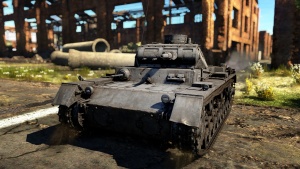
The Pz.III B is one of the worst starter vehicles in terms of overall survivability. The armour thickness of the hull and sides are 14.5 mm thick, with 16 mm on the turret face. This isn't even enough protection to nullify heavy machine gun fire, which leaves this vehicle almost universally vulnerable from almost all vehicles present in the lower ranks. By angling the hull, you can potentially bring the protection up to 20 mm effective on the front and sides, but this is a superficial boost to armour and will still not reliably protect the tank from any incoming rounds. The only advantage survivability wise this vehicle has is the crew count as it has 5 members. Because most of the incoming fire is going to be from low calibre AP rounds, it's very unlikely that this tank will be taken out in a single shot, though this is more of a passive advantage and not something you can actively make use of.
Armour type:
- Rolled homogeneous armour
- Cast homogeneous armour (Cupola)
| Armour | Front (Slope angle) | Sides | Rear | Roof |
|---|---|---|---|---|
| Hull | 14.5 mm (9°) Front plate 14.5 mm (49°) Front glacis 10 mm (15°) Lower glacis |
14.5 mm | 14.5 mm | 10 mm |
| Turret | 16 mm Turret front 16 mm Gun mantlet |
14.5 mm (25°) | 14.5 mm (20°) | 10 mm |
| Cupola | 14.5 mm | 14.5 mm | 14.5 mm | 10 mm |
Notes:
- Suspension wheels, tracks and torsion bars are 15 mm thick.
- Belly armour is 5 mm thick.
Mobility
| Game Mode | Max Speed (km/h) | Weight (tons) | Engine power (horsepower) | Power-to-weight ratio (hp/ton) | |||
|---|---|---|---|---|---|---|---|
| Forward | Reverse | Stock | Upgraded | Stock | Upgraded | ||
| Arcade | 40 | 7 | 16 | 271 | 506 | 16.94 | 31.63 |
| Realistic | 36 | 6 | 221 | 265 | 13.81 | 16.56 | |
The Pz.III B has fairly unimpressive mobility across all fronts, it can reach a maximum speed of 35 km/h in RB mode, and 39 km/h in AB mode. Compared to other reserve tanks, this is on the slower side by a large margin and therefore will struggle when it comes to reaching good spots early, pushing across the map and retreating from combat. This tied with the lack of meaningful armour really hurts this tank's overall performance. The only positive aspect of this tanks mobility is its hull traverse, which can help turn the turret and cannon quicker than just using the turret traverse on its own.
Modifications and economy
Armaments
Main armament
The Pz.III B is equipped with the 37 mm KwK36, which is a fairly underwhelming weapon performance wise. It can penetrate most lower rank vehicles at close range, but at further ranges the gun really does start to struggle. It's also fairly inaccurate, which makes aiming for certain weak spots quite difficult.
It comes with two available rounds -
- APHE- Max 47 mm penetration- Low penetration but higher damage potential
- APCR- Max 86 mm penetration- High penetration but lower damage potential.
It's best to consider taking a mix of both types of ammunition. The APHE has the potential to one-shot some enemy tanks, but will be completely ineffective against the more heavily armoured vehicles; for these tanks, it's best to use APCR and aim for flat surfaces. The APCR does very little damage internally, so try to aim for crew members if possible.
| 37 mm KwK36 | Turret rotation speed (°/s) | Reloading rate (seconds) | |||||||||||
|---|---|---|---|---|---|---|---|---|---|---|---|---|---|
| Mode | Capacity | Vertical | Horizontal | Stabilizer | Stock | Upgraded | Full | Expert | Aced | Stock | Full | Expert | Aced |
| Arcade | 121 | -10°/+20° | ±180° | N/A | 16.07 | 22.24 | 27.00 | 29.86 | 31.76 | 3.77 | 3.33 | 3.07 | 2.90 |
| Realistic | 3.57 | 4.20 | 5.10 | 5.64 | 6.00 | ||||||||
Ammunition
| Penetration statistics | |||||||
|---|---|---|---|---|---|---|---|
| Ammunition | Type of warhead |
Penetration @ 0° Angle of Attack (mm) | |||||
| 10 m | 100 m | 500 m | 1,000 m | 1,500 m | 2,000 m | ||
| PzGr | APHE | 47 | 44 | 31 | 21 | 14 | 9 |
| PzGr 40 | APCR | 86 | 77 | 47 | 26 | 14 | 8 |
| Shell details | ||||||||||||
|---|---|---|---|---|---|---|---|---|---|---|---|---|
| Ammunition | Type of warhead |
Velocity (m/s) |
Projectile mass (kg) |
Fuse delay (m) |
Fuse sensitivity (mm) |
Explosive mass (TNT equivalent) (g) |
Ricochet | |||||
| 0% | 50% | 100% | ||||||||||
| PzGr | APHE | 745 | 0.69 | 1.2 | 9 | 22.1 | 47° | 60° | 65° | |||
| PzGr 40 | APCR | 1,020 | 0.37 | - | - | - | 66° | 70° | 72° | |||
Ammo racks
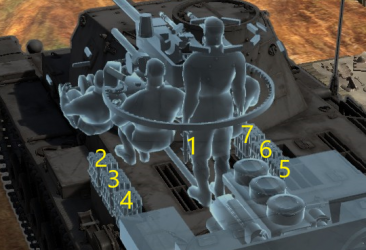
| Full ammo |
1st rack empty |
2nd rack empty |
3rd rack empty |
4th rack empty |
5th rack empty |
6th rack empty |
7th rack empty |
Visual discrepancy |
|---|---|---|---|---|---|---|---|---|
| 121 | 116 (+5) | 98 (+23) | 78 (+43) | 60 (+61) | 40 (+81) | 20 (+101) | 0 (+121) | No |
Note:
- Racks only disappear after all shells in the rack have been fired.
- Turret empty: 116 (+5) shells.
Machine guns
This vehicle is equipped with two coaxial 7.92 mm MG34 machine guns. As there are two of them, these machine guns are quite potent against enemy anti-air trucks and even against the slower biplane aircraft commonly encountered in lower rank battles. However, they have no functional viability against armoured vehicles and only serve as a last ditch effort to kick up dust or blind an enemy vehicle by firing at their optics.
| 7.92 mm MG34 | ||||
|---|---|---|---|---|
| Mount | Capacity (Belt) | Fire rate | Vertical | Horizontal |
| Coaxial | 1,800 (150) | 900 | N/A | N/A |
| Coaxial | 1,800 (150) | 900 | N/A | N/A |
Usage in battles
Overall, the Pz.III B doesn't have many reliable advantages, especially over the E variant. Both the armour and firepower leave a lot to be desired, although its mobility is somewhat functional. However, it just doesn't have any decent aggressive aspects to it that good mobility benefits, meaning that although it is the Pz.III B's most functioning asset, it's still not reliable to play aggressively on the move. The Pz.III B isn't equipped with a short stabiliser, meaning that the gun will be very unstable when coming to a stop, whereas the majority of allied vehicles do have this feature. So if you were to run into one of these vehicles on the move, your enemy will likely get the first shot off, and as your armour protection is so poor they will likely deal critical damage.
A somewhat reliable way to stay alive in this tank is to play hull-down, a lot of the rounds you'll be taking will be small calibre AP shots. If only your turret is exposed, these rounds will only usually take out 2 crew members at most, allowing for you to back off, repair and re-engage. Find a spot, take a few shots, and reposition before being spotted, as escaping a bad position is nearly impossible once compromised. The performance of the gun is overall very poor at distances, so even though survivability will be increased by playing at range, firepower will be very inconsistent, so try to find a spot that isn't too far away from combat.
The turret traverse of the Pz.III B is also very poor, at 4.2 degrees a second in RB mode, because of this it's a good idea to use the hull traverse to swing the turret around faster. The hull traverse itself is fairly fast, so utilising this is a decent habit to get in to. The situation you most want to avoid is losing your driver or engine, as your mobility is the only thing that will keep you in the fight, and the way to ensure this primarily is to stay in cover and not advance too far into the map. If an enemy gets on your side or rear, there's nothing you can really do as your turret traverse is disappointingly poor, so watch your flanks and try to minimise the possibility of an enemy getting behind you.
Pros and cons
Pros:
- Reasonably fast acceleration, decent top speed and hull traverse allows it to get to positions in time
- Decent survivability: spacious interior plus 5-man crew increases survivability against solid shells (e.g. M3 Stuart)
- Adequate firepower: stock AP can frontally penetrate and one-shot common foes like BT-5, while the APCR is quite effective in an uptier against the B1 bis
- Fast reload allows it to finish off remaining crew quickly
- Twin fast-firing 7.92 mm coaxial MG can quickly wipe out exposed crew, or even damage low-flying planes
Cons:
- Weak armour on all sides, can get penetrated by various tanks (e.g. M3 Stuart, BT-5) and even SPAA like M13 MGMC and GAZ-AAA (DShK)
- Small calibre gun lacks the damage to quickly destroy large tanks like the LVT(A)(1)
- Very slow turret traverse, may not be able the gun on fast targets
- Profile is quite large and tall, making it easier to be seen and shot at, and harder to conceal behind bushes or cover
- Poor reverse speed
History
The Panzerkampfwagen III (PzKpfw. III), also referred to as Panzer III, was a tank developed by the Germans in the 1930s and used in World War II. The PzKpfw. III was designed to take out other armoured vehicles while supporting the Panzerkampfwagen IV which task was mainly to take out unarmoured targets. The dome ring of the PzKpfw. III was unable to accommodate the increasingly heavy cannons needed to fight new tank types. Ultimately, the PzKpfw. III was replaced by the larger PzKpfw. IV as main battle tank. The PzKpfw. III was then delivered to some allies while the chassis was used for the very successful Sturmgeschütz III.
The suspension of the Pz.III A turned out to be too weak. The same year, a series of fifteen Ausführung B vehicles were built. The five running wheels were replaced by eight wheels with leaf springs. This increased the speed to 35 km/h. With Three instead of two wheels supporting the upper of the track. These vehicles were only intended for training, but eventually had to be assigned to the combat troops. The first models (A to E) were equipped with the short 37 mm KwK / 36 L46.5 gun, which performed sufficiently during the actions in 1939 and 1940.
Media
- Skins
See also
Links to the articles on the War Thunder Wiki that you think will be useful for the reader, for example:
- reference to the series of the vehicles;
- links to approximate analogues of other nations and research trees.
External links
| Germany medium tanks | |
|---|---|
| Pz.III | Pz.III B · Pz.III E · Pz.III F · Pz.III J · Pz.III J1 · Pz.III J1 TD · Pz.III L · Pz.III M · Pz.III N |
| Pz.IV | Pz.IV C · Pz.IV E · Pz.IV F1 · Pz.IV F2 · Pz.IV G · Pz.IV H · Pz.IV J · Pz.Bef.Wg.IV J |
| Pz.V | VK 3002 (M) · Panther A · Panther D · Panther F · Panther G · Ersatz M10 · Panther II |
| M48 upgrades | M48A2 G A2 · M48 Super |
| Leopard 1 | Leopard I · Leopard A1A1 · Leopard A1A1 (L/44) · Leopard 1A5 · C2A1 · Turm III |
| Leopard 2 | PT-16/T14 mod. · Leopard 2K · Leopard 2AV |
| Leopard 2A4 · Leopard 2 (PzBtl 123) · Leopard 2A4M · Leopard 2 PL · Leopard 2A5 · Leopard 2 PSO · Leopard 2A6 · Leopard 2A7V | |
| Trophies | ▀M4 748 (a) · ▀T 34 747 (r) |
| Other | Nb.Fz. · KPz-70 |
| USA | mKPz M47 G · M48A2 C |
| USSR | ◊T-72M1 |


